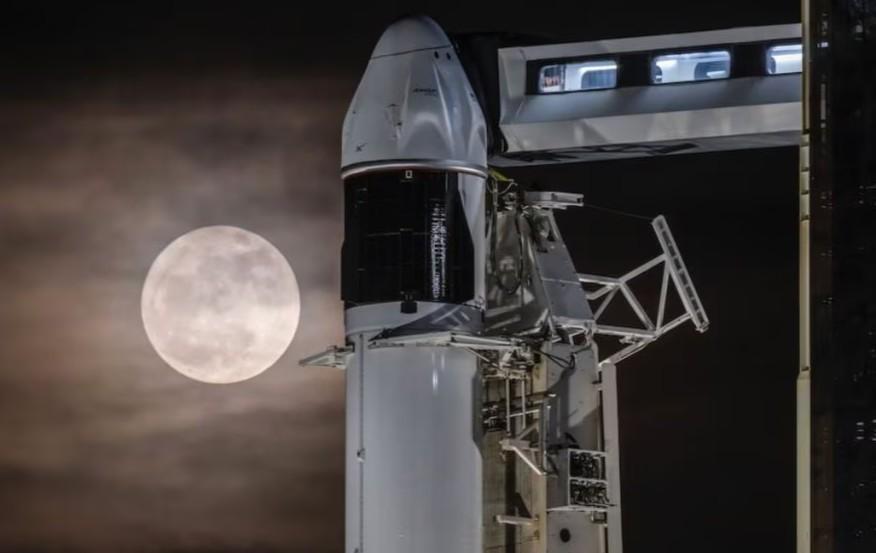
Pichai, Musk & Bezos competing to establish data centres on Moon: Report
The world’s top tech moguls, Sundar Pichai, Elon Musk, and Jeff Bezos, are reportedly engaged in a new and ambitious venture: establishing data centres on the Moon. According to a recent report by the Wall Street Journal, these industry leaders are exploring the possibility of storing and processing data on the lunar surface, citing the Moon’s unique environment as a major advantage.
The report highlights that the Moon offers a stable environment with low temperatures in certain regions, which could significantly reduce cooling costs for servers. This is a crucial consideration, as data centres on Earth often require massive amounts of energy to cool their servers, which can lead to high operational costs and environmental concerns. By leveraging the Moon’s natural environment, these tech giants may be able to minimize their carbon footprint while also reducing their expenses.
Another significant advantage of building data centres on the Moon is the availability of open land. Unlike on Earth, where environmental concerns and urbanization have limited the availability of land for large-scale construction projects, the Moon’s surface is largely untouched and unregulated. This means that companies like Google, SpaceX, and Amazon could potentially build huge facilities without worrying about the environmental impact or zoning restrictions that they would face on our planet.
The idea of establishing data centres on the Moon may seem like science fiction, but it’s not entirely far-fetched. With the rapid advancement of technology and the increasing demand for data storage and processing, it’s likely that companies will need to explore innovative solutions to meet their growing needs. The Moon, with its unique environment and abundant resources, could potentially become a hub for data storage and processing in the near future.
Sundar Pichai, the CEO of Google, has been at the forefront of innovation in the tech industry, and his company has already made significant investments in cloud computing and data storage. Elon Musk, the CEO of SpaceX, has been actively pursuing the development of lunar infrastructure, including the establishment of a permanent human settlement on the Moon. Jeff Bezos, the founder of Amazon, has also been exploring the possibility of establishing a human settlement on the Moon through his company Blue Origin.
The competition between these tech giants to establish data centres on the Moon is likely to drive innovation and investment in the field of space technology. As companies like Google, SpaceX, and Amazon push the boundaries of what is possible, they may also create new opportunities for collaboration and cooperation. For example, they could work together to develop standardized protocols for data storage and processing on the Moon, or share resources and expertise to overcome the technical challenges associated with building and operating data centres in a lunar environment.
However, there are also significant challenges and uncertainties associated with establishing data centres on the Moon. For one, the lunar surface is a harsh and unforgiving environment, with extreme temperatures, radiation, and lack of atmosphere. Companies would need to develop specialized equipment and infrastructure that can withstand these conditions, which could be a significant technological hurdle.
Additionally, there are also regulatory and legal considerations that would need to be addressed. For example, who would have jurisdiction over data centres on the Moon, and what laws and regulations would apply? How would companies ensure the security and integrity of their data in a lunar environment, where the risk of hacking or data breaches could be higher due to the lack of physical security measures?
Despite these challenges, the potential rewards of establishing data centres on the Moon are significant. Not only could it provide a new and innovative solution for data storage and processing, but it could also help to drive economic growth and development in the space industry. As companies like Google, SpaceX, and Amazon continue to push the boundaries of what is possible, they may also create new opportunities for entrepreneurship, innovation, and exploration.
In conclusion, the report of Sundar Pichai, Elon Musk, and Jeff Bezos competing to establish data centres on the Moon is a significant development that highlights the growing interest in space technology and the potential for innovation and investment in this field. While there are certainly challenges and uncertainties associated with this venture, the potential rewards are significant, and it will be exciting to see how this story unfolds in the coming years.





